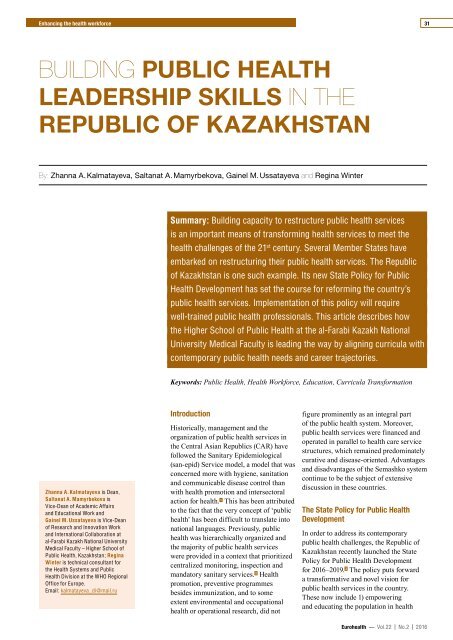EUROHEALTH
Eurohealth-volume22-number2-2016
Eurohealth-volume22-number2-2016
Create successful ePaper yourself
Turn your PDF publications into a flip-book with our unique Google optimized e-Paper software.
Enhancing the health workforce<br />
31<br />
BUILDING PUBLIC HEALTH<br />
LEADERSHIP SKILLS IN THE<br />
REPUBLIC OF KAZAKHSTAN<br />
By: Zhanna A. Kalmatayeva, Saltanat A. Mamyrbekova, Gainel M. Ussatayeva and Regina Winter<br />
Summary: Building capacity to restructure public health services<br />
is an important means of transforming health services to meet the<br />
health challenges of the 21 st century. Several Member States have<br />
embarked on restructuring their public health services. The Republic<br />
of Kazakhstan is one such example. Its new State Policy for Public<br />
Health Development has set the course for reforming the country’s<br />
public health services. Implementation of this policy will require<br />
well-trained public health professionals. This article describes how<br />
the Higher School of Public Health at the al-Farabi Kazakh National<br />
University Medical Faculty is leading the way by aligning curricula with<br />
contemporary public health needs and career trajectories.<br />
Keywords: Public Health, Health Workforce, Education, Curricula Transformation<br />
Zhanna A. Kalmatayeva is Dean,<br />
Saltanat A. Mamyrbekova is<br />
Vice-Dean of Academic Affairs<br />
and Educational Work and<br />
Gainel M. Ussatayeva is Vice-Dean<br />
of Research and Innovation Work<br />
and International Collaboration at<br />
al-Farabi Kazakh National University<br />
Medical Faculty – Higher School of<br />
Public Health, Kazakhstan; Regina<br />
Winter is technical consultant for<br />
the Health Systems and Public<br />
Health Division at the WHO Regional<br />
Office for Europe.<br />
Email: kalmatayeva_di@mail.ru<br />
Introduction<br />
Historically, management and the<br />
organization of public health services in<br />
the Central Asian Republics (CAR) have<br />
followed the Sanitary Epidemiological<br />
(san-epid) Service model, a model that was<br />
concerned more with hygiene, sanitation<br />
and communicable disease control than<br />
with health promotion and intersectoral<br />
action for health. 1 This has been attributed<br />
to the fact that the very concept of ‘public<br />
health’ has been difficult to translate into<br />
national languages. Previously, public<br />
health was hierarchically organized and<br />
the majority of public health services<br />
were provided in a context that prioritized<br />
centralized monitoring, inspection and<br />
mandatory sanitary services. 2 Health<br />
promotion, preventive programmes<br />
besides immunization, and to some<br />
extent environmental and occupational<br />
health or operational research, did not<br />
figure prominently as an integral part<br />
of the public health system. Moreover,<br />
public health services were financed and<br />
operated in parallel to health care service<br />
structures, which remained predominately<br />
curative and disease-oriented. Advantages<br />
and disadvantages of the Semashko system<br />
continue to be the subject of extensive<br />
discussion in these countries.<br />
The State Policy for Public Health<br />
Development<br />
In order to address its contemporary<br />
public health challenges, the Republic of<br />
Kazakhstan recently launched the State<br />
Policy for Public Health Development<br />
for 2016–2019. 3 The policy puts forward<br />
a transformative and novel vision for<br />
public health services in the country.<br />
These now include 1) empowering<br />
and educating the population in health<br />
Eurohealth — Vol.22 | No.2 | 2016
















